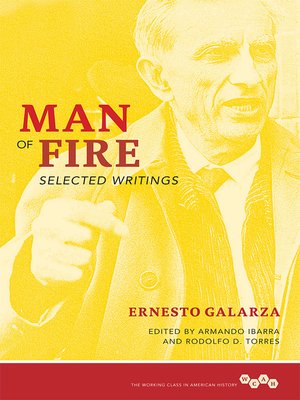
Sign up to save your library
With an OverDrive account, you can save your favorite libraries for at-a-glance information about availability. Find out more about OverDrive accounts.
Find this title in Libby, the library reading app by OverDrive.



Search for a digital library with this title
Title found at these libraries:
| Library Name | Distance |
|---|---|
| Loading... |
Activist, labor scholar, and organizer Ernesto Galarza (1905–1984) was a leading advocate for Mexican Americans and one of the most important Mexican American scholars and activists after World War II. This volume gathers Galarza's key writings, reflecting an intellectual rigor, conceptual clarity, and a constructive concern for the working class in the face of America's growing influence over Mexico's economic system. Throughout his life, Galarza confronted and analyzed some of the most momentous social transformations of the twentieth century. Inspired by his youthful experience as a farm laborer in Sacramento, he dedicated his life to the struggle for justice for farm workers and urban working-class Latinos and helped build the first multiracial farm workers union, setting the foundation for the emergence of the United Farm Workers Union. He worked to change existing educational philosophies and curricula in schools, and his civil rights legacy includes the founding of the Mexican American Legal Defense Fund (MALDEF) and the National Council of La Raza (NCLR). In 1979, Galarza was the first U.S. Latino to be nominated for the Nobel Prize in Literature, for works such as Strangers in Our Fields, Merchants of Labor, Barrio Boy, and Tragedy at Chualar.|
Title Page
Copyright
Contents
Illustrations
Acknowledgments
Introduction
Organization of the Book
Part 1: Coming of Age in a Class Society
In a Mountain Village
On the Edge of the Barrio
Part 2: Mexican Labor, Migration, and the American Empire
Life in the United States for Mexican People: Out of the Experience of a Mexican
Program for Action
California the Uncommonwealth
Part 3: Action Research in Defense of the Barrio
Personal Manifesto
The Reason Why: Lessons in Cartography
Economic Development by Mexican-Americans in Oakland, California
Alviso: The Crisis of a Barrio
Part 4: Power, Culture, and History
Mexicans in the Southwest: A Culture in Process
The Mexican-American Migrant Worker—Culture and Powerlessness
How the Anglo Manipulates the Mexican-American
Part 5: Organizing against Capital
Labor Organizing Strategies, 1930–1970
Poverty in the Valley of Plenty: A Report on the Di Giorgio Strike
Plantation Workers in Louisiana
The Farm Laborer: His Economic and Social Outlook
Strangers in Our Fields
Part 6: Letters from an Activist
To Alfred Blackman, California Division of Industrial Safety, June 20, 1957.
To Congressman James Roosevelt, December 20, 1957
Open letter to Members of the House of Representatives, co-signed by NAWU President H. L. Mitchell
To Henry P. Anderson, April 2, 1958
To Henry P. Anderson, April 30, 1958
Letter to Henry P. Anderson, June 24, 1958.
To Jack Livingston, AFL-CIO Department of Organization, and Norman Smith, AFL-CIO Organizer, May 5
To Norman Smith, December 5, 1959
To "Liberal Friends who live in the East," March 18, 1960
Part 7: Appendix
Vale más la Revolución que viene
Selected Bibliography
Select Chronology
Index
|
A Choice Outstanding Academic Title, 2013.
— A Choice Outstanding Academic Title, 2013.
|Armando Ibarra is an assistant professor in the School for Workers at the University of Wisconsin-Extension. Rodolfo Torres is a professor of urban and regional planning and urban studies at the University of California, Irvine. His other books include Race Defaced: Paradigms of Pessimism, Politics of Possibility.Constructing Identities in Mexican American Political Organizations: Choosing Issues, Taking Sides
|Armando Ibarra is an assistant professor in the School for Workers at the University of Wisconsin-Extension. Rodolfo Torres is a professor of urban and regional planning and urban studies at the University of California, Irvine. His other books include Race Defaced: Paradigms of Pessimism, Politics of Possibility.Constructing Identities in Mexican American Political Organizations: Choosing Issues, Taking Sides







